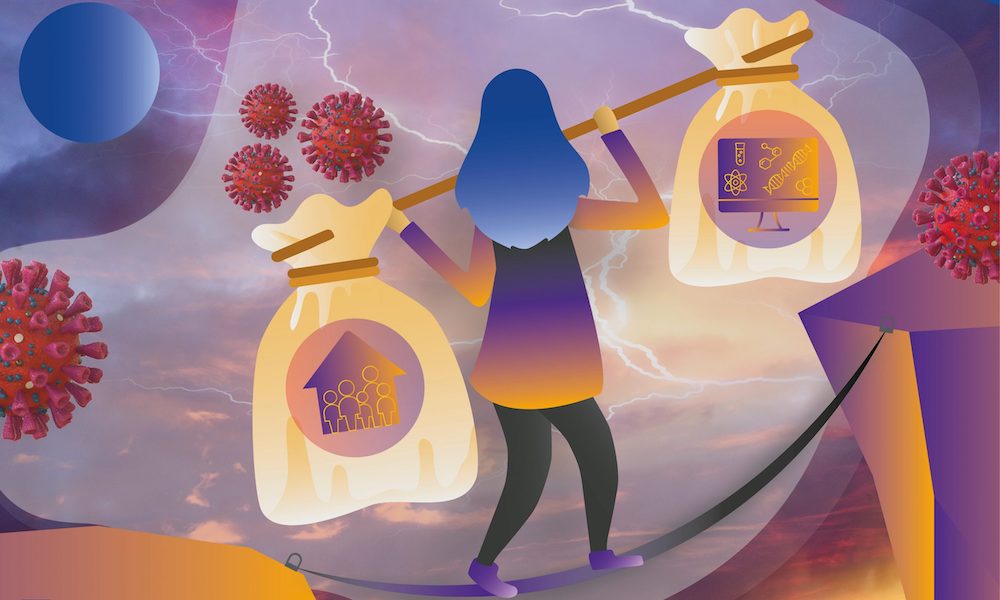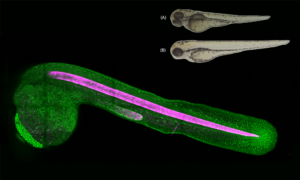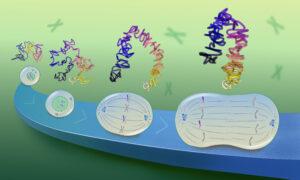
COVID-19’s indirect attack on women
Virtual conference to address systemic inequalities for women in science revealed by coronavirus pandemic

While the virus that causes COVID-19 may not discriminate by gender, indirect impacts of the coronavirus crisis apparently do. And women in science face unique challenges. This is at the heart of a virtual conference EMBL will hold on 9 September: ‘The impact of the COVID-19 crisis on women in science: Challenges and solutions’.
Earlier in August, The Lancet reported on COVID-19’s indirect impacts more broadly on women. Despite the World Health Organization’s calculation that, in its European region, men account for 57% of deaths from COVID-19 and 70% of admissions to intensive care, women have experienced disproportionate, unique, and plentiful indirect impacts, such as employment issues, care responsibilities for children and elders, and increases in domestic violence. For women in science, these distinctions are revealed in additional ways.
Two EMBL researchers, Jan Korbel and Oliver Stegle, surveyed life scientists earlier this year to gather perspectives on COVID-19’s effects. They also found female respondents disproportionately affected by the shutdown.
“The number of preprint publications from women scientists has declined significantly since the crisis began. Women often shoulder the bulk of child-rearing, care of elders, and many other household responsibilities, and it’s become clear that organisations need to address these roles and help find a way for women scientists to still have room to succeed at work,” says EMBL Director General Edith Heard, who will speak at the conference on institutional leadership during COVID-19. “Conferences like this will help bring to light gender-specific issues, helping us continue to grow and do a better job as leaders of scientific research organisations.”
More than 500 people have registered for this conference that is free and open to all. Pre-registration is still available and required to attend.
Speakers represent a diverse group of women scientists who will provide insight into the effect of the COVID-19 pandemic on their work and future prospects. Prominent scientific leaders will explain practical steps, solutions, and actions they are implementing at their research institutions, which could serve as the basis for the ‘new normal’ in academia.
“The COVID-19 crisis has undoubtedly affected us all,” says conference speaker Roni Wright, a cancer researcher at the Centre for Genomic Regulation (CRG) and at UIC Barcelona. “Women, more specifically mothers, in science have been especially hard hit. Like them, each of their struggles and triumphs are unique, as is the support they are going to need to get through it. I will touch on my own personal experiences and struggles and the measures initiated from an institutional perspective to help all working mothers during this time.”
The bulk of the conference will involve discussion of strategies to preserve gains in gender equality, covering both immediate responses and a longer-term recovery effort.
“Any approach to define and implement adequate strategies at all levels, including the field of research and innovation, to be considered effective must integrate a gender perspective,” says conference speaker Zulema Altamirano Argudo, director of the Women and Science Unit at the Science and Innovation Ministry in Spain. “This means to identify, make visible, and tackle any form of gender inequality in research and innovation systems where the pandemic might be having an impact. It also means to be able to foresee the different consequences of this impact for women and men in science and innovation, for instance, in their career path.”
Rounding out the day, leaders of scientific research organisations will talk about how they adapted during a pandemic with no real precedent for addressing the gender issues that came so clearly to light. These talks will cover what leadership is able to do in this situation, lessons learned, and the challenges ahead.
The conference will include open forums for discussion and will provide mental health tools and resources. For more information and to register, click here.


